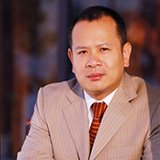Expert Interview – Feng Cai Qiu, Executive Director/Senior Partner, Singapore Empower Consulting Group Pte, China
 For the report Performance Management in 2012, The KPI Institute conducted 12 semi-structured interviews with practitioners, academics and consultants, who created a detailed image of Performance Management as a discipline.
For the report Performance Management in 2012, The KPI Institute conducted 12 semi-structured interviews with practitioners, academics and consultants, who created a detailed image of Performance Management as a discipline.
Dr. Feng Cai Qiu, Executive Director/Senior Partner at Singapore Empower Consulting Group Pte, China was one of the consultants that The KPI Institute interviewed.
1. What does the term Performance Management mean to you?
Different groups understand the concept of “Performance Management” in different ways. In China, the different concepts are combined and selected in order to suit the political and environmental conditions before putting them into practice. According to my research in Europe and North America on the practice of performance management in China, I think several features should be mentioned: First, from the group perspective, performance management is a synergy of individual, family and organization. The cooperation and effect amongst these three parties contributes to a sustained high performance in an organization. Second, performance management is an integral activity. From the vision and target design to the process control, to result evaluation and then to the final achievement, the whole process is a closed circle. People in China generally accept this point of view. Third, from the finance perspective, performance management is a control system. The CEO treats it as a system in which different strategies can be applied and implemented; HR treats it as a tool which can explore employees’ abilities to achieve their targets, allowing them to cooperate with the organization; Employees treat this as a tool which can make their work clearer, more organized through a higher degree of planning.
Thus, in China, the concept of performance management varies with different people; each approach has value in practice and is feasible. When it comes to the group’s point of view, from the performance management’s essence and processes to its role on management decisions, we should consider it from different angles..
2. What drives interest in Performance Management?
In reality, the Chinese public are not interested in this topic, they are actually quite critical of it. HR might be interested, and the researchers may be more interested in it. Most of the staff have a negative feeling towards performance management, and leaders in industries are not interested in it. According to our survey within China, nearly 50% of the employees and organizations have low recognition and satisfaction towards performance management.
Personally speaking, I am very interested in this topic because I am both a researcher and a practitioner, and I am also an expert who promotes this concept in China. I think that performance management is helpful to individuals, families and organizations since I practice it myself and have experienced its benefits. That is the reason why I do it. However in China, the concept has not been driven, instead, there are more pain, resentment, resistance and rejection.
3. What are your thoughts on the relationship between performance management at organizational, departmental and individual level?
I do not agree with some of the arguments put forward by Western countries on performance management. Their process involves setting goals at the organizational level, then breaking them down at the departmental level, followed by having the departments complete the goals and missions by way of allocating tasks to sectors and finally passing them down to the employees. As a result, the goal of the entire organization can only be achieved if the individual staff members complete the tasks that are assigned to them. I think that this method of performance management is only half of the picture.
In China, the other half relates to relationship dynamics; it is impossible to make a conclusion as to whether it should be the individual priority or the organizational priorities, because sometimes individual performance management is superior organizational performance management. In this case, when designing a performance management system, we should use bottom-up method instead of top-down one, which means the organization, is at mercy to performance management at the individual level. In this case, the organization needs to do some adjustments and optimizations according to the individual needs, goals and internal commitments. By doing this, the entire organization can achieve high performance and organizational goals.
From this perspective, In order to ultimately achieve the organizational performance individual performance should be a focus. This relationship is often present in the high-tech and traditional businesses. This is especially important now for a number of reasons:
- “career boredom” from people who started their careers in the 1980s and 1990s, the impact of the Internet economy,
- the talent diversity and individuality, and the seamless exchange of knowledge promote the relationships among staff
This means that the performance management system amongst the individual, department and organizational levels has become increasingly complex. It is not simply individuals at the mercy of the organization or vice versa. In the international arena, I think this relationship will become increasingly diverse and personalized. Therefore, we need to model ourselves on companies that are already doing this.
For some large state-owned enterprises in China, employees obey the department and the department obeys the organization from the enterprise, central, provincial and prefectural level. However, for the grass-roots enterprises which are under the prefecture level, if they want to achieve high performance, most of the time, the departments are required to obey the individuals. When the individuals are subordinate to the organizations, a clearer symbiotic relationship exists.
So in China, we need to consider the relationships according to different levels, groups, industries and organizational maturities. Grass-roots employees are more adaptive and can go with the flow; therefore, the use of performance management should be in an open environment. In this environment, the relationship between individuals, departments and organizations is relatively casual; while individuals still obey the department and the department still obeys the organization, the organization is more receptive to suggestions put forward at the departmental level and similarly the departmental to the individual level. This is symbiotic relationship. For organizations which are in a non-market environment, they are in a very traditional organizational environment, so there is very clearly a top-down relationship there.
4. What are the 2012 key trends in Performance Management from the perspective of your knowledge and experience in this field?
I think there are a few points you may want to consider: first, from the central and the national point of view, the concept of and practice of performance management will continue be valued and enhanced. Last year, Premier Wen proposed to strengthen the reform of performance management in government, and also piloted the idea in Shenzhen, Shanghai and Xiamen. From the SASAC perspective, SASAC has asked more than 150 state-owned enterprises to carry out the implementation of a performance management system.
In the private sector, because of market competition and financial crisis, improving basic operations and improving their work quality and efficiency, are two reasons they also strengthen performance management. From the education system, the performance management is perpetually being improved and refined. There are more and more scholars considering individual differences when they study performance management. Thus, from the academic point of view, performance management is increasingly popular.
Second, from the entire technological environment point of view, there are three parts worth mentioning.
1) First, the Balanced Scorecard in the past few years gained a lot of promotion, but there are plenty of problems that came out during the process of promotion. I did research in the University of Nottingham and Cambridge in England, and I also communicated with Dr. Kaplan, the professor in Harvard University. I found that many Chinese enterprises had problems when they were using the Balanced Scorecard. They began to doubt the practicality of the Balanced Scorecard in China. This is also my PhD research topic. After much research and investigation, I found that Chinese organizations casted doubt on the application of the BSC and started thinking about how to improve the BSC in order to make it adapt to the Chinese environment better. This also means the technology and ideas behind its logic required some adjustments. China now has already begun research in this area, and I am also looking for a suitable BSC.
2) Secondly, the application of KPIs in the technical fields is not enough. In Britain, Professor Neely in Cranfield School has published a book named “Performance Prism”. This theory is rarely known by people in China, because there are not enough people who are interested in learning, understanding and applying this theory. Therefore, it is not as popular as the Balanced Scorecard in China and there are not many people putting it to use.
3) Third, China is still using the DuPont method. In financial management applications, organizations assess business performance by decomposing the original DuPont index to set KPI targets. In addition, the Chinese state-owned enterprises are primarily using EVA in evaluating the performance. China is still using this method, and is still improving upon it.
4) Whether Chinese organizations can make the Balanced Scorecard, KPIs and traditional EVA assessment to align and to evaluate different levels of employees within an organization. For example, the strategic level may adopt the BSC, the departmental level may use KPIs and the staff level may create a new model to evaluate what is detailed, but staff growth and development can still occur while maintaining the company’s vision and financial objectives, despite having different PM tools being used. Currently, the demand of performance management at the technical level is very high. However, it is hard to say whether the study that involves hierarchical classification of different performance management systems would be successful or not. I have done a lot of research in this area, and created the models to explore a suitable performance management system to our employees. This system should be different from the Balanced Scorecard, the EVA and the complicated KPIs, it can track staff to help them concentrate on their future and their personal development, helping them to reach their individual dreams and needs, which can stimulate enterprises to reach sustainably higher levels of performance while at the same time improve the efficiency of the process. How to incorporate these comprehensive factors together, which are the past, the present and the future, the financial and non-financial systems, the leading and lagging indicators, are also mentioned by Kaplan in the Balanced Scorecard concept.
Third, more and more people in China require a new system to be designed to suit the employee level. The third trend is the group in China that will pay close attention to performance management. In 2012, the foreign-funded enterprises will focus less on performance management, because they have incorporated it as a part of their quality management system. However, I think more people in state-owned enterprises will be concerned about performance management, because they are facing competition and internationalization they don’t want to lose their momentum in the global financial environment. Therefore, more managers and HR departments will pay attention to performance management in the state-owned enterprises level and in the employee level. In addition, the degree of concern in private enterprises in 2012 will also be improved, but not as much as the state-owned enterprises. Private enterprises are also not completely out of the impact of financial crisis. The state-owned enterprises do not have such problems, and they only need to focus on development and expansion. Therefore they need have suitable performance management in the aspects of technology, management and innovation.
Fourth, In terms of the academic field, they will shift their attention from the strategic level to the technical and theoretical research on the staff-level. There has too much research on the strategic level worldwide but too little attention to individual performance management in a more diverse society. In China, the individual environment is experiencing a turbulent time, and the employees ideological values have not yet fully formed; many scholars and experts may not be aware of this fact and know how to design a performance management system for those employees who have not formed their own dominant values. This is not only relevant to China, but also to the world. In the future, it will be a trend and also a challenge to study performance management in a diverse, intricate and flexible environment.
5. What aspects of performance management should be explored more through research?
I think performance management should be studied more from an individual human level more than a technical, group level. This is the paradigm shift academics need. For example, when I was doing academic research in the United Kingdom and the United States, I found that even though the application and implementation of performance management systems in enterprises are identical to that in a Chinese context, their results are higher and better than that of China. This is because their culture matches the theory. In China however, the human environment has several characteristics that need to be considered.
First, study the effect of China’s political influence on the enterprise, and the associated workplace satisfaction, employment, values and professional ideology from the perspective of the Chinese people. This idea directly impacts on staff’s concept of employment and their judgment on their success. In European countries, this perception has been formed, while in China, it is still blank. Therefore, in the human environment, the application and implementation of performance management is that we need a breakthrough.
Second is the research on the enterprise environment. In China, the ecological environment increasingly affects the execution and implementation of performance management. This ecological environment includes presidents. The presidents in Chinese enterprises and in foreign-funded enterprises are not the same: general managers in China are not determined by the market, or the shareholders, or the business performance. Therefore, the study of how leaders affect performance management and whether there is a performance management system suitable for Chinese environment, this subject will be more and more important.
Third, study the changes in the staff’s mentality, especially the difference between 80-90s and 50-60s. There is a huge change and conflict on the outlooks on life, values, career outlook and personalized view within these 30 years. This change in Western countries occurred over the space of 100 years. Following in the ideological background of traditional Chinese culture, the traditional business leaders (who were born in 1950s-1960s) have plenty of conflict with their employees (who were born in 1980s-1990s). This conflict will affect the design of performance management systems, coordination and matching, and to promote a balance between employers and employees inside the organization.
Fourth, I’m doing a study of the harmonious development of performance management. China raised three slogans: a rapid and healthy development, to create a harmonious environment and education reform. Researchers in performance management should study how to get individuals, families and organizations to cooperate and respond to the characteristics of China’s development. In Kaplan’s theory, the relationship between staff, organization and customer is coordinated very well. There are still some criticism that the theory has no synergy to role of the government, suppliers, buyers and other interested persons. In China, I will be researching more in the collaborative management of individuals, families and organizations, since they represent different customer needs. At present, the government also proposed this need, and both businesses and ordinary people need a harmonious, healthy and happy organization. Performance Management is an entry point and we have the opportunity to explore how we can design system that encourages better performance.
6. Please provide some examples of organizations which you would recommend for study due to their approach to performance management and achievements.
Currently, we can’t say China has a successful case. I’ve been a performance consultant in China Mobile for 10 years. Upon utilizing Performance Management concepts and frameworks, China Mobile was able to reach a higher level, but not a very successful level. China Mobile achieved results in three aspects by using performance management. First, it improved the market coverage from top to bottom, and its market share is over 72% now in China. Second, its revenue market share accounted for more than 70% of the whole market in China. There two indicators show China Mobile’s improvement on its financial performance through performance management. Third, through the pressure transmission of performance management, China Mobile pushed the Chinese mobile communication industry to greater heights. Communication used to be a luxury, while now almost everyone in China has a cell phone. This is not because something the telecommunications industry brought about. It was actually caused by the mandatory introduction of China Mobile’s KPIs. China Mobile made every employee take a top-down market penetration approach, which meant focusing on the city to the countryside, then to the children. This mechanism promotes the development of the Chinese communication industry to the world and the upgrading of the Chinese peoples’ quality of life in the modern era.
7. Which are the main challenges of Performance Management in practice today?
The challenges in government departments, state-owned enterprises, foreign-funded enterprises and private enterprise are not the same. But they also have some basic commonalities.
First, the political environment in China for performance management is not very mature.
Second, the soil for China to implement performance management also needs to be cultivated. This soil refers to the human resources market, which requires fair, free and open competition, and this in China is not yet fully formed. Therefore, the concept of “fair competition and survival of the fittest” of performance management is quite difficult to achieve, and performance management cannot play its proper role in China. For example, in foreign companies the Balanced Scorecard is used as an important tool to do staff classification in order to promote fair competition, while this situation is difficult to achieve in China. This is because Chinese companies cannot let employees leave the company, or dismiss unsatisfactory employees. China does not exist in this environment, because Chinese employees are formal workers who cannot be dismissed easily. Human resources market in foreign countries is a free market; it is a two-way voluntary relationship. Therefore, in the Chinese context, effective performance management is difficult to achieve because of the lack of free competition and the difficulty to leave a company.
Third, the level of professionalism in the application performance management needs to be upgraded. In fact, many business owners, managers and employees apply performance management but not in its original form, but rather relate it to the company’s variety of professional capacity system, for instance, incentive management, targets management, practice management, application systems, and docking new systems. The ability of professional managers in these areas is still lacking. Therefore, performance management is not a single system, but is required to supplement other systems. Hence, it requires professional managers have a stronger ability to apply strict Performance Management frameworks and China is still in progress. Fourth, the performance management system in China is different from what is in foreign countries that pay more attention to the rules and systems. Therefore, in foreign countries, when the performance management system is used in the enterprise, there is system interaction and this interaction results in the desired effect of performance management. However in China, regardless of the state-owned enterprises or private enterprises, many systems are still building. Therefore, when linking performance management to immature systems, the effect will be affected. Many people are still wary and don’t understand how Performance Management can be used to the benefit of the individual and the enterprise.
8. What do you think should be improved in the use of performance management tools and processes?
Each person’s point of view should be different. With regards to the Balanced Scorecard in China, the biggest problem is not concern human resources, and not has a rigid and flexible combination within human resources. The biggest advantage of the Balanced Scorecard is the effective integration of operational systems and financial systems. I think this is Kaplan’s contribution. So when a business is in need of operating systems and financial systems designed for organizational effectiveness, promoting the organization of sustainable development, this theory will play a role. So it is necessary to identify what kind of companies will have this type of problem. But when the focus of a business at some stages is in the human resources or marketing, the BSC may not be the best tool. Although BSC also mentions the link between human resources, it only focuses on the association among the disciplines. How to use it in specific environment, what difficulties will be met during implementation and what features the human resources will have under different situations, those questions are waiting for in-depth study.
There are a plenty of cases and examples in the practice of using BSC in operational systems and financial systems, but considerably fewer in the case of human resources. The primary segment in the Kaplan case study is reform at the strategic and application levels in the 12 enterprises which are primarily located in Europe and America. However, the practice and exploration on human resources aspect needs to be increased. In addition, he did not take into account the difference between the human resources environment in Asia. Therefore, I also explore the application of the BSC in the Asian region, which needs to focus on the human resource management theory. In addition, the BSC does not take the psychological factors into account. It is more concerned with the overall organization’s application and day to day operations, but not concerned about each employees’ sustained growth and motivation. Although it is also known as the Staff Balanced Scorecard, its operation and logic aren’t focused on the psychological point of view, but rather from the financial perspective. Therefore, the BSC needs to be improved on the staff level. Globally, the successful Personal Balanced Scorecard theory is from an American, named Lecsion, he made a number of theories that really resonate with me. In his view point, the starting point of the Balanced Scorecard is “empowerment”, and the ending point is “finance”. In China, I think this theory could be continued to be studied and improved.
China uses KPIs very often, and three points need to be improved: First, how to improve KPI usage in collaborative departments. This is a short term key focus for KPIs. The biggest advantage of it is the vertical transmission, but it is relatively weak on the correlation of horizontal value transfer. Second, many administrative departments cannot use KPIs to quantify their performance, that is, they have trouble measuring immeasurable things. Third, distinguishing the lagging and leading KPIs and let staff perceive them correctly, as well creating a corporate linkage design is also difficult. Fourth, KPIs and BSC are becoming IT-oriented, which means to get efficiency improvement from the support of IT systems in order to reduce the influence of human factors, China also needs to be upgraded in this aspect.
9. What would you consider best practice in performance management?
The best practice should be at home. Bring BSC into families in order to create a harmonious and happy atmosphere in the family. I use performance management in my family, and I also encourage all the employees in my company to use it. Encouraging every employee use the concept of performance management to build a harmonious, happy and healthy family to stimulate them to work more efficiently is what I practice. It can also delay the departure of employees. To achieve the collaboration between employees, families and organizations, the employees in our company are a good example. In addition, as I mentioned before, China Mobile is also a good practice.
10. Which aspects of performance management should be emphasized during educational programs?
First, the national environment should be emphasized, which means how to design performance management systems under this country’s political environment. Second, organizational culture and the ecological environment will directly affect the practice of performance management theory. We need to study how different cultures are embedding the design and implementation of performance management systems, for instance, how to combine the human environment and the living environment of Chinese enterprises to make the performance management more practical. Third, the theory of performance management should be understood from practice, experienced and then summarized. In my opinion, university undergraduate and postgraduate students should be “60% study, 40% practice”, in order to really understand the practical science. This is my proposal for performance management education. For example, for a two-year EMBA, nine months should be used for practicing, so as to cultivate the demonstration of performance management capabilities. I raised 30 performance management capabilities and these capabilities must be proved through demonstration in order to become a qualified human resources student. In addition, on this basis, students must have a clear understanding on what are the specific projects of performance management capabilities. Take the 30 capabilities for example, we should tell students what they are, how to cultivate them, where can the students get the training for them and by using which way. When the students are qualified, which level they can reach, and what extent of work they can deal with after they go into the society. I hope those aspects could be emphasized because this applied talents are what China and the world welcomed.
11. What are the barriers to achieving higher levels of proficiency in performance management among practitioners?
First, the organizational culture. The culture of performance implementation directly impacts on the effect of an organizational performance execution. Performance culture includes the degree of recognition, competition, sense of fairness, identity and cooperation. A healthy performance culture is very important. Second, the science and differentiation of a performance management operating system. The science applies to different enterprises and different departments using different performance management systems. The differentiation means different departments should have different characteristics; therefore, they should use corresponding models to match their features. This is the scientific nature of performance management operating systems, which requires more targeting and differentiation, because it will directly affect the implementation of performance management. Many failures in China are due to the lack of consideration in these features at the designing stage. Third, the ability in the full performance management training and the level of application eligibility that will directly affect the implementation of performance management. The performance management application level in China now is not high enough. Foreign-funded enterprises may be higher and private enterprises are in the middle. Therefore, we need to train a large number of professional managers in the capability of performance management. Fourth, the implementation of performance management is a long-term behavior, which should be gradually optimized and promoted.
12. Which were the recent achievements in generating value from performance management in your organization?
From the staff’s point of view, first, the work structure is better meaning that the work will be more focused. Excellent employee incentives increase. Second, the number for excellent employees increases; the better they do their job, the greater return they will get. However, to the medium and poor staff, performance management deprives his rights and interests.
From the company’s point of view, through the operation of this system the company can, firstly, promote the establishment of long-term development concepts. By building such a system, long-term positive behavior in a company is increased. Secondly, the vitality of the organization will be raised. The activity may drop when performance management is just introduced into the company, however, the vitality will increase after a period of time. This vitality is mainly reflected in the business operations and it refers to the enthusiasm of the staff. Thirdly, in the long-run, after two or three years of introduction, the returns to shareholders will be increased, particularly for those enterprises which mandatorily implement performance management.
The Human Resources management can reach a higher level and have a stronger sense of accountability because the requirement on improving their professional standards is stronger. Before performance management is carried out, job challenges are relatively high. After implementation, the problems are highlighted, promoting the human resources to enhance the professionalism, and a change in the role from an affairs expert to a consultant expert.

Tags: Performance in China, Performance Management, Performance Management in 2012




